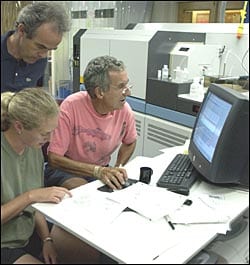News Releases
2005 New England Red Tide Media Briefings July 14
Contacts: WHOI: Shelley Dawicki 508-289-2270 or 508-566-7017 (mobile) NOAA: Ben Sherman 202-253-5256 (mobile) WHAT: Spring 2005 brought the worst “bloom” of the toxic alga Alexandrium fundyense since a massive outbreak…
Read MoreLife in Extreme Environments
Scientists have long known of organisms adapted to environments that appear inhosptable to any form of life, living in the 600-700??F waters of hydrothermal vents on the sea fl oor,…
Read MoreThe Internal Weather of the Sea
Currents, fronts and eddies, often called the internal weather of the sea, are major components of ocean circulation and can change the chemical and biological environment in the ocean. Four…
Read MoreA Natural Petroleum Spring
Bubbles stream from vents surrounding misshapen cones formed by thick liquid oozing from the sea floor. It may sound like a hydrothermal vent field near a mid-ocean ridge, but these…
Read MoreMarine Task Force to Develop National Standards for Ocean Aquaculture Announced
Additional Contact: Justin Kenney The Pew Charitable Trusts 215-575-4816, jkenney@pewtrusts.org (Washington, D.C.) The Pew Charitable Trusts, in collaboration with the Woods Hole Oceanographic Institution (WHOI), announces the establishment of the…
Read MoreHow Much Excess Fresh Water Was Added to the North Atlantic in Recent Decades?
Large regions of the North Atlantic Ocean have been growing fresher since the late 1960s as melting glaciers and increased precipitation, both associated with greenhouse warming, have enhanced continental runoff…
Read MoreScientists Map Ocean Floor Near Palmer Station in Antarctica
Using inflatable boats, a portable depth sounder with GPS, and a REMUS autonomous underwater vehicle, a team of scientists and engineers has created the first detailed, comprehensive chart of the…
Read MoreHurricanes and the Coastal Zone
With hurricane season arriving June 1, along with predictions of an above normal number of major storms in the Atlantic and Gulf States, understanding how the ocean and atmospheric interact…
Read MoreWhat is That in the Water?
As summer vacations approach, beachgoers might want to bring along a guide to what they and their children will see on the beach and in the water. WHOI scientists and…
Read MoreBlooms of a Different Sort
Commonly called “red tides,” harmful algal blooms, or HABs, are an abundance or “bloom” of single-celled marine algae called phytoplankton that grow and multiply under the right conditions. Among the…
Read MoreG. Unger Vetlesen Foundation Honored by Woods Hole Oceanographic Institution
Woods Hole Oceanographic Institution recently honored The G. Unger Vetlesen Foundation of New York with the prestigious Cecil H. Green Award. The award, named for Texas Instruments’ founder and philanthropist…
Read MoreWHOI Scientists Monitor Largest Red Tide Outbreak in 12 Years in Massachusetts Bay
With shellfish beds from Maine to the Cape Cod coast closed from the largest outbreak of red tide in 12 years in Massachusetts Bay, scientists from the Woods Hole Oceanographic…
Read MoreNew Underwater Volcano Found Near Samoa
An international team of scientists, led by researchers at the Woods Hole Oceanographic Institution, Scripps Institution of Oceanography, University of Oregon and University of Sydney, has discovered an active underwater…
Read MoreScientists Find Unusual Use of Metals in the Ocean
Cadmium, commonly considered a toxic metal and often used in combination with nickel in batteries, has been found to have a biological use as a nutrient in the ocean, the…
Read MoreWHOI Scientist Elected to American Academy of Arts and Sciences
Woods Hole Oceanographic Institution (WHOI) Senior Scientist Stanley Hart of the Geology and Geophysics Department was recently elected a Fellow of the American Academy of Arts and Sciences, one of…
Read MoreDiving to the Rosebud Vents – Galápagos Rift
In 2002, researchers diving in the submersible Alvin returned to the Galápagos Rift, a mid-ocean ridge about 250 miles from the Galápagos Islands in the eastern Pacific Ocean where hydrothermal…
Read MoreTiny Computer Tag Provides Insight to Reclusive Beaked Whales
A miniature computer weighing less than 5 ounces attached to the backs of beaked whales with suction cups is providing new clues to the behavior and sounds made by the…
Read MoreExploring the Seas from Top to Bottom
WHOI research vessels are exploring the oceans this spring from Bermuda to the Bay of Fundy in the North Atlantic and from Mexico to the Galápagos Islands in the eastern…
Read MoreSalty Staircase in the Atlantic Provides Clues to Ocean Mixing
Layers of salty ocean water mix with layers of fresher water, creating a salty staircase or layering driven by small-scale convection known as salt fingers. Although scientists have known about…
Read MoreSea Squirt Invasion: Scientists Gather at WHOI for First International Conference
Scientists, natural resource managers and students from four continents will gather at the Woods Hole Oceanographic Institution (WHOI) April 21 and 22 to discuss a growing global problem: the sea…
Read MoreNew Coral Dating Technique Helps Resolve Changes in Sea Level Rise in the Past
Corals from Papua New Guinea and Barbados indicate that changes in sea level, one of the key indexes for global climate change, may have been more frequent in the past…
Read MoreWHOI Establishes Award to Recognize Contributions of Navy Admiral, Oceanographer
A former Oceanographer of the Navy and Rear Admiral who headed Marine Operations at the Woods Hole Oceanographic Institution (WHOI) for 14 years has been honored by the Institution with…
Read MoreChanges in Earth’s Tilt Control When Glacial Cycles End
Scientists have long debated what causes glacial/interglacial cycles, which have occurred most recently at intervals of about 100,000 years. A new study reported in the March 24 issue of Nature…
Read MoreElephants Imitate Sounds as a Form of Social Communication
Elephants learn to imitate sounds that are not typical of their species, the first known example after humans of vocal learning in a non-primate terrestrial mammal.
Read More
